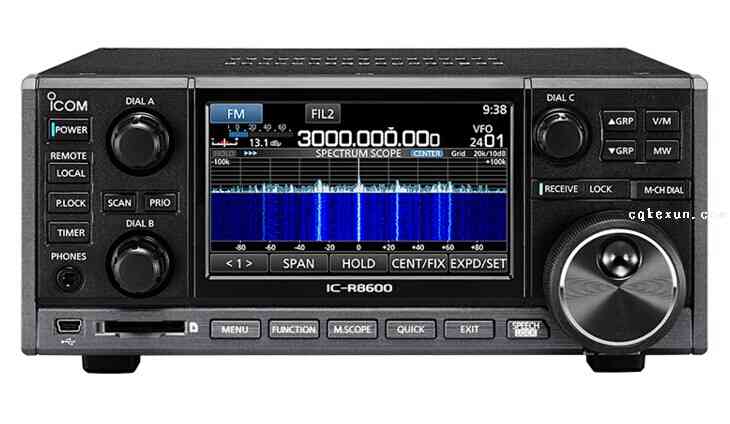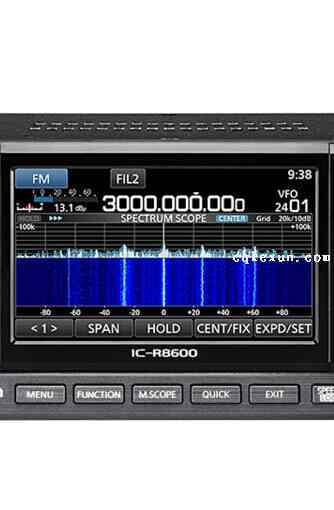
10kHz to 3GHz Super Wideband Coverage The IC-R8600 decodes various digital protocol signals including P25 (Phase 1), NXDNTM, dPMRTM, D-STAR, Japanese DCR (Digital Convenience Radio) as well as receives conventional analog signals such as USB, LSB, FSK, CW, AM, S-AM (Synchronous-AM), FM and WFM modes, covering 10kHz to 3GHz wideband in 1Hz steps. Absolute Value of RSSI (Received Signal Strength Indicator) The IC-R8600 shows S-meter, dBμ, dBμ (emf) and dBm meter types in the RSSI. The dBμ, dBμ (emf) and dBm meter has a high ±3dB accuracy* (between 0.5–1100MHz) that can be used for measuring signal strength level. * Less than ±6dB between 1100–3000MHz. Software Demodulation in FPGA Processing The IC-R8600 utilizes FPGA (Field Programmable Gate Array) and DSP units for demodulation, decoding and most of signal processing. Direct HF signals and intermediate frequency signals, which are converted from VHF/UHF signals, are digitized in a 14-bit A/D converter and transferred to the FPGA and DSP for optimal processing. The high-rate 122.88MHz sampling frequency used for the A/D converter results in superior aliasing and image reception reduction. Superb Receiver Performance The IC-R8600 has 11 discrete RF bandpass filters in the HF bands and 13 bandpass filters in the VHF/UHF bands. To prevent overflow, only the intended signal is passed, while any out of range strong interference signals are rejected. The IC-R8600 provides +30dBm IP3 and 105dB dynamic range at 14.1MHz. IP3 performance is +10dBm at 144MHz and 0dBm at 440MHz. Ample Memory Channels The IC-R8600 has up to 2000 regular memory channels assignable to 100 groups. In addition to the regular memory channels, up to 100 scan skip channels and 50 pairs of program scan edges can be set. The auto memory write scan automatically stores busy frequencies in the auto memory write channels (up to 200 channels). These memory channels and various settings can be edited with the optional CS-R8600 programming software on a Windows PC. Variety of Scan Functions A variety of scan functions effectively and thoroughly search for desired stations. The IC-R8600 scans up to 100 channels per second in the memory scan mode. ·Program scan/Fine program scan ·⊿f scan/⊿f fine scan ·Priority scan ·Memory scan ·Selected memory scan ·Selected mode memory scan ·Auto memory write scan Real-time Spectrum Scope with Waterfall Function The high-resolution real-time spectrum scope provides class-leading performance in resolution, maximum 30 frames per second* fast sweep speed, ±2.5MHz wide scope span (display range) and 110dB of dynamic range (at ±2.5kHz span). The waterfall screen allows you to find weak signals by showing the spectrum change over time. When tapping the spectrum scope or waterfall screen, the tapped area can be selected as the operating frequency. The peak search function finds several peak frequencies within the scope range, and helps you to select these. (* Approximate) Quick, Smooth and Intuitive Operation To efficiently acquire intended signals, the IC-R8600 user interface provides quick and accurate operation. The large 4.3-inch color display, with touch screen function, is configured to collect operating information. By tapping indications and icons on the screen, the setting menu will pop up and parameters can easily be adjusted. When either the DIAL A, B or C multi-function control knobs is pushed, various functions, such as scan speed, RF gain, audio tone, display backlight or other menus will pop up on the display. Pop up menu appears by pushing DIAL B Functions menu for touch screen operation SD Card Slot for Receiver Recorder The recorder function can record received audio onto an SD card in WAVE format. The recorded voice audio can be played back on the receiver or a PC. When a 32GB SD card is used, up to 270 hours of recording is possible. In addition, the screen capture function saves a snap shot of the screen in PNG or BMP format on the SD card. * An SD card is required separately. Remote Control Function through IP Network or USB Cable The optional RS-R8600 PC remote control software allows you to listen to received audio and control most of the receiver functions, including the spectrum scope, through an IP network or USB cable. RS-R8600 screen I/Q Signal Output The I/Q signal output function* allows you to derive digital IF signals from the I/Q output jack. It can be used for analyzing spectrum or decoding signals. * This function will be provided with future firmware update. A third-party software may be required separately. Other Features ·3 antenna connectors: an SO-239 type and a phono (RCA) connector for HF and a type-N connector ·Clock and NTP function ·Center tuning meter and digital auto frequency control (AFC) for FM, WFM and digital modes ·Voice synthesizer function ·Audio tone functions: HPF/LPF, bass, treble and de-emphasis ·Decode multiple digital code used in digital mode ·IP+ function improves 3rd order intercept point performance ·Main dial friction adjustment ·Dial lock and panel lock ·CI-V remote control commands Rear Panel View ·NXDN is a trademark of Icom Incorporated and JVC KENWOOD Corporation. ·dPMR and the dPMR logo are trademarks of the dPMR MoU Association. ·Windows is either a registered trademark or a trademark of Microsoft Corporation in the United States and/or other countries. ·D-STAR (Digital Smart Technology for Amateur Radio) is a digital radio protocol developed by JARL (Japan Amateur Radio League). Specifications General General Frequency coverage USA: 0.010000–821.999999MHz*, 851.000000–866.999999MHz, 896.000000–3000.000000MHz (* Guaranteed range: 0.100000–821.999999MHz) EXP: 0.010000–3000.000000MHz (* Guaranteed range: 0.100000–3000.000000MHz) Antenna connector ANT 1 (0.01–3000MHz): Type-N (50Ω) ANT 2 (0.01–30MHz): PL-259 (50Ω) ANT 3 (0.01–30MHz): RCA (500Ω) Frequency stability Less than ±0.5ppm (at 25℃ after warm up) Mode USB, LSB, CW, FSK, AM, FM, WFM, Digital (D-STAR, P25 Phase 1, NXDN, dPMR, DCR) Number of channels 2000 regular with 100 groups, 200 auto memory write, 100 skip and 100 scan edge channels Scan types Programmed, memory, selected memory, selected mode, auto memory write, priority scan and ⊿f scan


